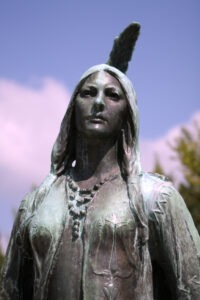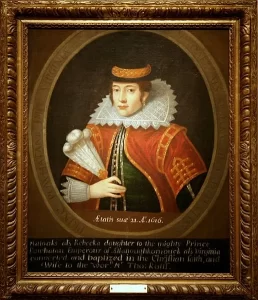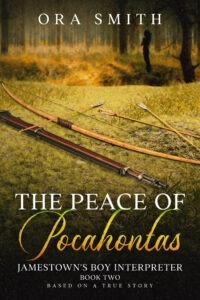When the English first established Jamestown, Virginia in 1607, their relationships with the Indigenous Peoples (sometimes called ‘the Powhatans’ after Chief Powhatan, Pocahontas’s father) was precarious. Powhatan and the English settlers regarded each other with suspicion. Eventually, the two groups had inevitable conflicts and warred from 1610-1614. A lull in the fighting occurred 1614-1622 and was called The Peace of Pocahontas because the marriage of Pocahontas to an Englishman, John Rolfe, created a new concept of “getting along.” Powhatan and Deputy Governor Dale agreed to the marriage ending the conflict.
Interracial marriages in 1614 were extremely rare among Europeans when John’s and Pocahontas’s marriage was sanctioned by the Anglican Church. Their marriage was big news in both the old and new worlds. Rolfe wrote in his letter to Dale that “all the world may truly say: This is the work of God, and it is marvelous to our eyes” (Spelling corrected).

John Rolfe, the man who married Pocahontas (no, it wasn’t Captain John Smith, the love interest in Disney and other movies…Pocahontas was only eleven when Smith came on the scene) was so friendly it was made comment on by contemporaries in historical records. Rolfe is often remembered for the successful strain of Spanish tobacco he grew in Virginia, which became the commodity that made fortunes for the growers along the James River. But in Rolfe’s written letter to Sir Dale before Pocahontas’s baptism, he stated that his love for her was so strong that he worried if marrying her (a nonbeliever in Christ) was acceptable to his Christian beliefs. He said he prayed continually for the answer, and it eventually came to him from God that he was to teach her of Christ.
I believe Pocahontas to have been someone exceptional for her time. When writing my book, The Peace of Pocahontas, I read as many seventeenth-century English writings as I could find but considered them dubious and sometimes controversial. Claiming the story of Pocahontas as presented in English records as “historical fact” makes me uncomfortable. Instead, I have presented in my book a version of what could have happened as relating to those English records and to the Powhatan peoples’ religion, lifestyles, and civilization as far as historians understand. The Powhatans did not have a written record in the 17th century, so they have been overwhelmingly underrepresented.

Because I write historical fiction using as many facts as I can gather, I’m always reminded of how much we don’t know about past events. We usually don’t realize how people felt, the desires of their hearts, what they accomplished, or how their personalities and experiences drove them to make decisions. Looking for these aspects of a person is what motivates my research and creates how my stories are written.
When it comes to Pocahontas’s conversion to Christianity, there is of course no way I can know her heart and spiritual experiences with God. But it appears she converted to Christianity of her own accord through teachings by Reverend Whitaker and John Rolfe. Judging from Rolfe’s own passionate writings, he was a devout Christian and desired Pocahontas to have the same beliefs. It was the goal of many English people to bring Protestant Christianity to the Natives.
My greatest surprise while researching the book The Peace of Pocahontas was realizing after she was kidnapped, she was taken to Rocke Hall in Henricus where a Christian school had already been established for the Natives. Set up by Reverend Alexander Whitaker and Sir Thomas Dale, its purpose was to educate children in English ways and convert them to Christianity. I had no idea the concept of a Christian School for Natives had been devised so early in American history. Sir Dale had also planned a university for the Native boys, choosing the site where it would be built, but it never came to fruition. There have been many things done in the name of Christianity—wrong and right—and these schools throughout history were both evil and good. I can’t even try to unwind all the intricacies of why some took advantage of children while others did not. Or why some people thought they could force Christianity on another.
Pocahontas was and still is a fascinating woman. In all of history, can we find a young girl who played such an important part in a civilization? Pocahontas’s influence was far-reaching in the foundational history of the United States. Why did her father Powhatan allow his eleven-year-old daughter to help the original settlers? I suspect he preferred peaceful relations in the beginning and let his daughter play the part of ambassador. The settlers probably would have perished if not for the gifts of food she brought them. But why Pocahontas as ambassador? Did her father have insight into something we do not? Did he, and subsequently, Pocahontas believe in her objective for a greater peace? I believe all of us have a specific purpose(s) in life, and it doesn’t need to be on a grand scheme to be meaningful. God uses all people to achieve His purposes. Those who have clarity to know their purpose and have strength and courage to fulfill it usually do so at great sacrifice. That, I believe, is the story of Pocahontas.

